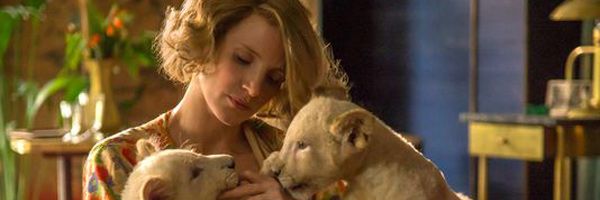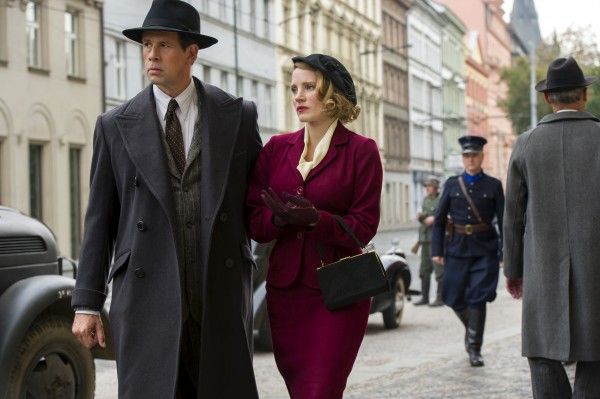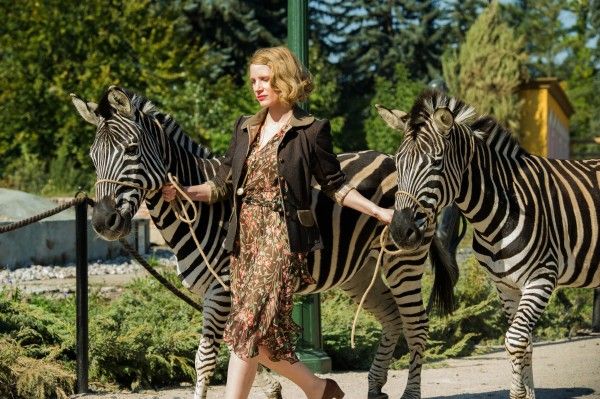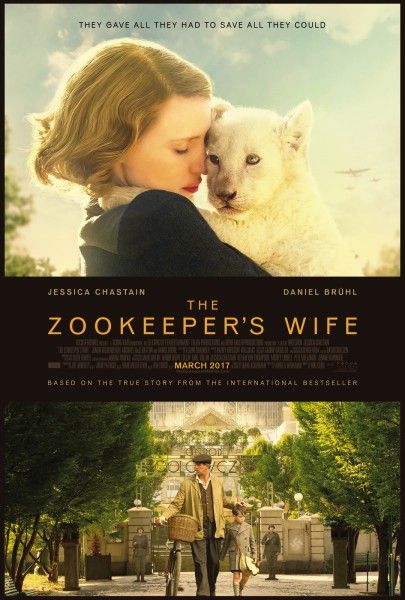In some ways, Niki Caro’s The Zookeeper’s Wife feels incredibly timely. It’s a film that’s about people who could have gone about their business taking a risk to protect the persecuted. While present-day America is nowhere near Nazi Germany (contrary to what Tim Allen says), a story like the one presented in The Zookeeper’s Wife is always important: we must find a way to protect others even if it’s at great risk to ourselves. The problem the film continues to run into is that it never really wants to reach for those risks or show the dangers. While the film occasionally glimpses at the darkness the Jews had to face in Nazi-occupied Warsaw, the movie largely focuses on the benevolence of its title character and her husband.
Based on the true story of Antonina Żabińska (Jessica Chastain) and her husband Jan (Johan Heldenbergh), the film follows the Żabińskas as they protect Jews in their bombed-out zoo in Warsaw, Poland during the Nazi occupation. Although their effort to protect Jews begins with just a few family friends, it soon expands to bring in children and others who are trying to escape from the ghetto and ultimately the reach of the Third Reich. However, as the war continues, their marriage becomes frayed as Antonina tries to manipulate German officer Lutz Heck (Daniel Brühl) and Jan joins the resistance movement.
There’s nothing particularly bad about The Zookeeper’s Wife, and it feels incredibly well-intentioned. I also like that it’s a film directed by a woman, written by a woman (Angela Workman), and features a woman as the hero. On paper, The Zookeeper’s Wife is a good movie, but unfortunately, Caro never really makes the picture come alive. It always feels like it’s keeping the Holocaust at arm’s length, not because it’s trying to cover up those horrors, but because it wants to remain tethered to the Żabińskas’ perspective. Since those two characters aren’t directly witnessing the brutality, the ugliness is only glimpsed.
Granted, we don’t need a movie to directly show us these horrors to know that they happened, but it then raises the question of who the story belongs to: does it belong to the noble gentiles or does it belong to the Jews? Where the movie backfires is that by keeping the focus so squarely on the Żabińskas’, it turns the Jewish characters into objects. In an odd way, they become dehumanized not through cruel treatment but by almost being animals who need protection. The setting, zoo cages, doesn’t really help that depiction, and while Caro obviously doesn’t intend to dehumanize the Jewish characters, they still feel one-dimensional.
On the one hand, people like the Żabińskas should be celebrated, and I’m glad that there’s a movie to recognize their struggle and bravery. But on the other hand, they’re part of a much larger struggle, and The Zookeeper’s Wife has difficulty maintaining the balance of who should be the focus of this larger historical narrative. Ultimately, The Zookeeper’s Wife is an admirable movie, but that doesn’t necessarily make it a good one.
Rating: C+
The Zookeeper's Wife opens in limited release on March 31st.




